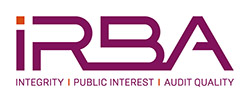IRBA says additional measures required to promote transformation of audit profession
| Johannesburg, Wednesday, June 21, 2017 - In the face of criticism that Mandatory Audit Firm Rotation (MAFR) will not address transformation of the profession, the Independent Regulatory Board for Auditors (IRBA) said in parliament today at a hearing of the Standing Committee on Finance (SCOF) that additional measures to drive transformation will be required to address government’s concerns regarding de-concentration of the audit market and transformation.
Audit rotation was prescribed in terms of Section 10 of the Auditing Profession Act 2005 (Act 26 of 2005) as a rule for auditors to safeguard auditor independence and after 1 April 2023, no audit firm may serve a public interest entity (PIE) client for longer than the prescribed ten-year limit. The rule was issued in response to concerns of declining audit quality, excessive tenures and increasing concerns around a lack of independence, both real and perceived, that could negatively impact the quality of the audit opinions. IRBA reported that it had agreed with the Minister of Finance, Malusi Gigaba, that while MAFR was best suited to address the independence of auditors by bringing an end to excessively long tenures of audit firms with their clients, it would not necessarily on its own facilitate the growth and participation of black audit firms in a market that has been historically dominated by the big four audit firms. Therefore, prior to the 2023 implementation date, additional measures would be required to prevent the mere rotation of audits between the big four and ensure that meaningful black participation increases through equity ownership and that black owned firms are grown and capacitated to take on the work of large listed entities. It noted that there was a real need to:
The IRBA believes that the implementation of mandatory audit firm rotation is a first step which will force a break in closed and restricted markets which will allow opportunities for black auditors to participate, but it also noted that greater transparency was required with regards to audit firm ownership, transformation policies and performance. While transparency reporting is not yet required in South Africa, it may become a useful tool for audit committees and shareholders. The UK framework includes provision for audit firms to disclose, amongst others, descriptions of network relationships, a description of the governance structure of the firm, detailed explanations of internal quality control systems and an assessment of the effectiveness of quality control, descriptions of the firm’s independence procedures and practices and confirmation that an internal review was conducted, the firm’s annual financial statements and information on the remuneration of partners. In South Africa it could also include BEE ownership and employment equity reports. IRBA said that transformation of the governance structures that select and appoint audit firms was also necessary to ensure diversity and that the selection and appointment of auditors was not restrictive, selective or influenced by the management of companies. Since the gazetting of the measure on 5 June 2017, international regulators have started to respond with messages of support. The Financial Reporting Council of the United Kingdom CEO, Stephen Haddrill responded: "I commend South Africa for its decision to introduce mandatory rotation, and congratulate the IRBA for its leadership. This step builds on the leadership South Africa has already shown in corporate governance and reporting. The reforms of governance will in particular enable the success of rotation. They provide confidence that audit committees will take full ownership of tendering and put quality and the interests of investors above price in their objectives. Our own experience is that the retendering of longstanding audit contracts has driven innovation and improvements in audit quality and I look forward to the same experience in South Africa." Ends More about the IRBA: The IRBA is a public protection statutory body established to protect the financial interests of the public by ensuring registered auditors and their firms deliver services of the highest quality. It upholds audit firm independence to ensure that audit quality is such that it enhances the accuracy and credibility of financial performance reporting. In this way, the IRBA has an important role to play in building the reputation of South Africa as an investment market for both local and global investors and driving economic growth for the country. As an internationally recognised regulator of the auditing profession and other assurance services relevant to the South African environment, it has been recognised by the World Economic Forum as the top independent audit regulator worldwide for seven consecutive years for the strength of its audit controls and standards. The IRBA also registers suitably qualified accountants as auditors, who must adhere to the highest ethics standards, and promotes the auditing profession through the effective regulation of assurance conducted in accordance with internationally recognised standards and processes.
|





